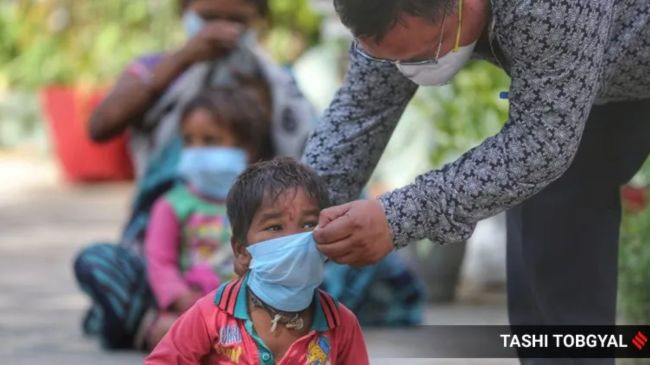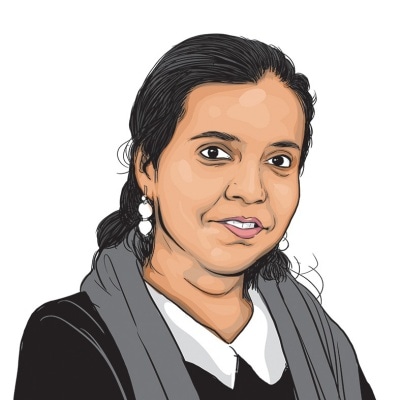Opinion Why we are reluctant to memorialise Covid
Memories of Covid are still everywhere. Remembering and memorialising is mostly an act of protection in case our memories fade and fail
 Though there was wide interest in India and the international press to report the five-year anniversary of Covid, there was limited response from readers and the public wanting to relive these memories (Express File)
Though there was wide interest in India and the international press to report the five-year anniversary of Covid, there was limited response from readers and the public wanting to relive these memories (Express File) Looking back at a crisis to understand how it changes society is a natural preoccupation. Last month in India marked five years since the massive lockdown in 2020 to contain the spread of Covid. As such, it is a timely occasion to revisit the implications of the Covid pandemic on our society and its meaning and impact.
As a historian of epidemics and curious reader of the recent “anniversary” coverage of the pandemic, I noticed an unusual trend. Though there was wide interest in India and the international press to report the five-year anniversary of Covid, there was limited response from readers and the public wanting to relive these memories. Last week, in New York city, where nearly 45,000 people died in the first wave of Covid, a group of bereaved family members had to remind the public and the city administration that no action had been taken to erect a Covid memorial, though the city had promised one at a site on Hart Island, where thousands were hastily buried. The UK, in contrast, has a National Covid Wall near the Thames to mourn lives lost to the pandemic.
This brings me to ask, when do societies collectively feel the need to remember and commemorate the beginning and end of a pandemic? Is it when we feel the crisis has truly ended? Is it when we feel distanced, and are ready to immortalise its suffering and losses? Is history then best served very cold? In the case of Covid, are we still in a period of continuity and chronicity, when the epidemic and its trauma linger?
During the pandemic, there was growing interest amongst urban media and viewership to read and report the history of public health in relation to epidemics and their politics. They compared Covid-related lockdowns and emergencies with sanitary cordons and quarantines in the past. Through podcasts and the news, the public was made to wonder about past crises: What must it have felt like to live and to lose loved ones in hours and days, and to have lives, work and travel unmoored and upended? Holding the past close, invoking it, helped us navigate uncertainty, and mostly, simply pass time, as we watched TV and waited in fear and limbo in the confines of our homes.
Some of this reporting discussed the passing of arbitrary quarantine regulations for human and maritime traffic, and coercive acts by the colonial police that inspected bodies and homes by force. The past was eerily resurrected when in May 2021, a village in Ludhiana self-quarantined to stop NRIs and visitors from potentially bringing infections into the village, much like medieval cities that closed their gates to travellers. Covid brought about fears of large gatherings. We realised that scapegoating and blaming “others” for bringing the epidemic was pervasive, in the present and past. The Haj pilgrims on their way to Mecca in the 1860s were blamed for the spread of the so-called Asiatic cholera, though the pilgrims pointed out that it was the state’s responsibility to offer sanitary arrangements. The British blamed the spread of cholera on Hindu pilgrims at Haridwar and Allahabad due to the Kumbh Melas held in 1867, 1890 and 1892, and missionaries claimed that cholera thrived in Hindu pilgrimage centres such as at Puri in Odisha. Past echoes resonated when in March 2020, disproportionate blame was ascribed to the Tablighi Jamaat congregation in Delhi, whose followers were accused of being coronavirus “superspreaders”.
What about pandemics that were not recorded and are barely remembered in memorials? The influenza pandemic appeared in 1918 even as the plague was barely extinguished in India, and World War I and its military and economic crises were deepening. It left a trail of unparalleled deaths, exceeding 12 million, most over a short and brutal window of three months between October and December 1918. But it was also enmeshed in other problematic memories of war and hunger, and this meant that social recollections of the pandemic were sparse.
In India today, we seem much less inclined to revisit our recent, pandemic past. Perhaps because Covid was — and continues to linger as — the classic epidemic of our changing times. Though we were given magic-bullet vaccines and drugs that declared the conquest of Covid’s mortality, though we are cured, we are yet to heal, left with unanswered questions about its chronic fallout. There are generations of children and young people whose developmental progress was affected by the lockdown that followed the Covid outbreak, and the effects of long Covid are still under investigation. Sadly, they are navigating these challenges as patients, and families, on their own. At the other end of the course of life, older persons experienced persistent cognitive deficits after the lockdown, and post-Covid “brain fog” had long term effects on memory. All these are uncertainties in knowledge and resources that linger. We know Covid exploited past failures of immunity and ill health. The most vulnerable communities, undernourished, lacking stable housing, sanitation and access to care, were also the worst affected by the pandemic. The ability to recover after a massive, complex crisis is psychological and social and not merely biomedical. So, a better way to remember our individual and collective Covid experiences could be to forget what are “given” lessons, such as cures and triumphal narratives of recovery.
We are still not fully ready to remember Covid and decide how we interpret its devastation. This merely indicates that our knowledge and judgement of events is incomplete. Memories of Covid are still everywhere. Remembering and memorialising is mostly an act of protection in case our memories fade and fail. For now, Covid is linked to other infectious and chronic public-health epidemics and untreated traumas in our society. It remains a part of our lived experiences.
The writer is associate professor, Sociomedical Sciences, Columbia University






